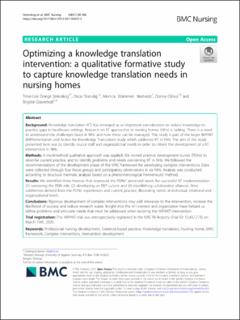| dc.contributor.author | Steinskog, Trine-Lise Dræge | |
| dc.contributor.author | Tranvåg, Oscar | |
| dc.contributor.author | Nortvedt, Monica Wammen | |
| dc.contributor.author | Ciliska, Donna | |
| dc.contributor.author | Graverholt, Birgitte | |
| dc.date.accessioned | 2021-09-30T11:36:31Z | |
| dc.date.available | 2021-09-30T11:36:31Z | |
| dc.date.created | 2021-08-13T19:40:35Z | |
| dc.date.issued | 2021 | |
| dc.identifier.citation | Steinskog, T.-L. D., Tranvåg, O., Nortvedt, M. W., Ciliska, D., & Graverholt, B. (2021). Optimizing a knowledge translation intervention: a qualitative formative study to capture knowledge translation needs in nursing homes. BMC Nursing, 20, 106 | en_US |
| dc.identifier.issn | 1472-6955 | |
| dc.identifier.uri | https://hdl.handle.net/11250/2786616 | |
| dc.description.abstract | Background
Knowledge translation (KT) has emerged as an important consideration to reduce knowledge-to-practice gaps in healthcare settings. Research on KT approaches in nursing homes (NHs) is lacking. There is a need to understand the challenges faced in NHs and how these can be managed. This study is part of the larger IMPAKT (IMPlementation and Action for Knowledge Translation) study which addresses KT in NHs. The aim of the study presented here was to identify crucial staff and organizational needs in order to inform the development of a KT intervention in NHs.
Methods
A multimethod qualitative approach was applied. We invited practice development nurses (PDNs) to describe current practice, and to identify problems and needs concerning KT in NHs. We followed the recommendations of the development phase of the MRC framework for developing complex interventions. Data were collected through four focus groups and participatory observations in six NHs. Analysis was conducted according to structural thematic analysis based on a phenomenological hermeneutic method.
Results
We identified three themes that expressed the PDNs’ perceived needs for successful KT implementation: (1) narrowing the PDN role, (2) developing an EBP culture and (3) establishing collaborative alliances. Nine subthemes derived from the PDNs’ experiences and current practice, illustrating needs at individual, relational and organizational levels.
Conclusions
Rigorous development of complex interventions may add relevance to the intervention, increase the likelihood of success and reduce research waste. Insight into the NH context and organization have helped us define problems and articulate needs that must be addressed when tailoring the IMPAKT intervention.
Trial registration
The IMPAKT trial was retrospectively registered in the ISRCTN Registry (Trial ID: 12,437,773) on March 19th, 2020. | en_US |
| dc.language.iso | eng | en_US |
| dc.publisher | BMC | en_US |
| dc.rights | Navngivelse 4.0 Internasjonal | * |
| dc.rights.uri | http://creativecommons.org/licenses/by/4.0/deed.no | * |
| dc.title | Optimizing a knowledge translation intervention: a qualitative formative study to capture knowledge translation needs in nursing homes | en_US |
| dc.type | Journal article | en_US |
| dc.type | Peer reviewed | en_US |
| dc.description.version | publishedVersion | en_US |
| dc.rights.holder | © 2021 The Author(s) | en_US |
| dc.subject.nsi | VDP::Medical disciplines: 700::Health sciences: 800 | en_US |
| dc.source.pagenumber | 1-11 | en_US |
| dc.source.volume | 20 | en_US |
| dc.source.journal | BMC Nursing | en_US |
| dc.identifier.doi | 10.1186/s12912-021-00603-5 | |
| dc.identifier.cristin | 1925952 | |
| dc.source.articlenumber | 106 | en_US |
| cristin.ispublished | true | |
| cristin.fulltext | original | |
| cristin.qualitycode | 1 | |

